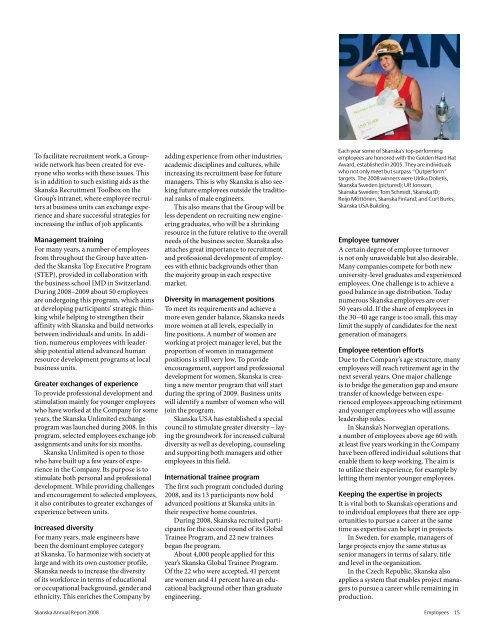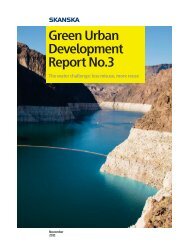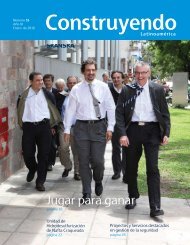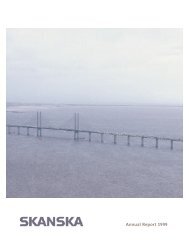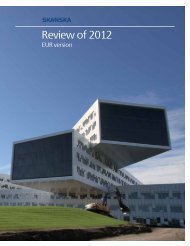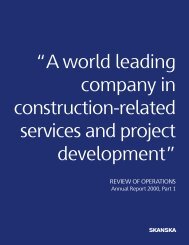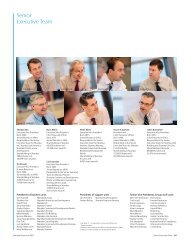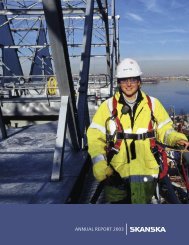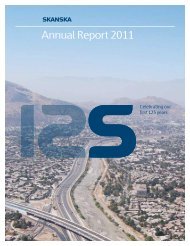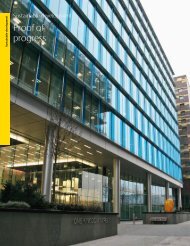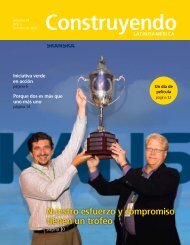Annual Report 2008 - Skanska
Annual Report 2008 - Skanska
Annual Report 2008 - Skanska
Create successful ePaper yourself
Turn your PDF publications into a flip-book with our unique Google optimized e-Paper software.
To facilitate recruitment work, a Groupwide<br />
network has been created for everyone<br />
who works with these issues. This<br />
is in addition to such existing aids as the<br />
<strong>Skanska</strong> Recruitment Toolbox on the<br />
Group’s intranet, where employee recruiters<br />
at business units can exchange experience<br />
and share successful strategies for<br />
increasing the influx of job applicants.<br />
Management training<br />
For many years, a number of employees<br />
from throughout the Group have attended<br />
the <strong>Skanska</strong> Top Executive Program<br />
(STEP), provided in collaboration with<br />
the business school IMD in Switzerland.<br />
During <strong>2008</strong>–2009 about 50 employees<br />
are undergoing this program, which aims<br />
at developing participants’ strategic thinking<br />
while helping to strengthen their<br />
affinity with <strong>Skanska</strong> and build networks<br />
between individuals and units. In addition,<br />
numerous employees with leadership<br />
potential attend advanced human<br />
resource development programs at local<br />
business units.<br />
Greater exchanges of experience<br />
To provide professional development and<br />
stimulation mainly for younger employees<br />
who have worked at the Company for some<br />
years, the <strong>Skanska</strong> Unlimited exchange<br />
program was launched during <strong>2008</strong>. In this<br />
program, selected employees exchange job<br />
assignments and units for six months.<br />
<strong>Skanska</strong> Unlimited is open to those<br />
who have built up a few years of experience<br />
in the Company. Its purpose is to<br />
stimulate both personal and professional<br />
development. While providing challenges<br />
and encouragement to selected employees,<br />
it also contributes to greater exchanges of<br />
experience between units.<br />
Increased diversity<br />
For many years, male engineers have<br />
been the dominant employee category<br />
at <strong>Skanska</strong>. To harmonize with society at<br />
large and with its own customer profile,<br />
<strong>Skanska</strong> needs to increase the diversity<br />
of its workforce in terms of educational<br />
or occupational background, gender and<br />
ethnicity. This enriches the Company by<br />
adding experience from other industries,<br />
academic disciplines and cultures, while<br />
increasing its recruitment base for future<br />
managers. This is why <strong>Skanska</strong> is also seeking<br />
future employees outside the traditional<br />
ranks of male engineers.<br />
This also means that the Group will be<br />
less dependent on recruiting new engineering<br />
graduates, who will be a shrinking<br />
resource in the future relative to the overall<br />
needs of the business sector. <strong>Skanska</strong> also<br />
attaches great importance to recruitment<br />
and professional development of employees<br />
with ethnic backgrounds other than<br />
the majority group in each respective<br />
market.<br />
Diversity in management positions<br />
To meet its requirements and achieve a<br />
more even gender balance, <strong>Skanska</strong> needs<br />
more women at all levels, especially in<br />
line positions. A number of women are<br />
working at project manager level, but the<br />
proportion of women in management<br />
positions is still very low. To provide<br />
encouragement, support and professional<br />
development for women, <strong>Skanska</strong> is creating<br />
a new mentor program that will start<br />
during the spring of 2009. Business units<br />
will identify a number of women who will<br />
join the program.<br />
<strong>Skanska</strong> USA has established a special<br />
council to stimulate greater diversity – laying<br />
the groundwork for increased cultural<br />
diversity as well as developing, counseling<br />
and supporting both managers and other<br />
employees in this field.<br />
International trainee program<br />
The first such program concluded during<br />
<strong>2008</strong>, and its 13 participants now hold<br />
advanced positions at <strong>Skanska</strong> units in<br />
their respective home countries.<br />
During <strong>2008</strong>, <strong>Skanska</strong> recruited participants<br />
for the second round of its Global<br />
Trainee Program, and 22 new trainees<br />
began the program.<br />
About 4,000 people applied for this<br />
year’s <strong>Skanska</strong> Global Trainee Program.<br />
Of the 22 who were accepted, 41 percent<br />
are women and 41 percent have an educational<br />
background other than graduate<br />
engineering.<br />
Each year some of <strong>Skanska</strong>’s top-performing<br />
employees are honored with the Golden Hard Hat<br />
Award, established in 2005. They are individuals<br />
who not only meet but surpass “Outperform”<br />
targets. The <strong>2008</strong> winners were Ulrika Dolietis,<br />
<strong>Skanska</strong> Sweden (pictured); Ulf Jonsson,<br />
<strong>Skanska</strong> Sweden; Tom Schmidt, <strong>Skanska</strong> ID;<br />
Reijo Möttönen, <strong>Skanska</strong> Finland; and Curt Burks,<br />
<strong>Skanska</strong> USA Building.<br />
Employee turnover<br />
A certain degree of employee turnover<br />
is not only unavoidable but also desirable.<br />
Many companies compete for both new<br />
university-level graduates and experienced<br />
employees. One challenge is to achieve a<br />
good balance in age distribution. Today<br />
numerous <strong>Skanska</strong> employees are over<br />
50 years old. If the share of employees in<br />
the 30−40 age range is too small, this may<br />
limit the supply of candidates for the next<br />
generation of managers.<br />
Employee retention efforts<br />
Due to the Company’s age structure, many<br />
employees will reach retirement age in the<br />
next several years. One major challenge<br />
is to bridge the generation gap and ensure<br />
transfer of knowledge between experienced<br />
employees approaching retirement<br />
and younger employees who will assume<br />
leadership roles.<br />
In <strong>Skanska</strong>’s Norwegian operations,<br />
a number of employees above age 60 with<br />
at least five years working in the Company<br />
have been offered individual solutions that<br />
enable them to keep working. The aim is<br />
to utilize their experience, for example by<br />
letting them mentor younger employees.<br />
Keeping the expertise in projects<br />
It is vital both to <strong>Skanska</strong>’s operations and<br />
to individual employees that there are opportunities<br />
to pursue a career at the same<br />
time as expertise can be kept in projects.<br />
In Sweden, for example, managers of<br />
large projects enjoy the same status as<br />
senior managers in terms of salary, title<br />
and level in the organization.<br />
In the Czech Republic, <strong>Skanska</strong> also<br />
applies a system that enables project managers<br />
to pursue a career while remaining in<br />
production.<br />
<strong>Skanska</strong> <strong>Annual</strong> <strong>Report</strong> <strong>2008</strong> Employees 15


